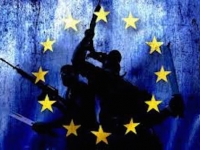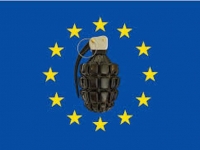Politics
EU RENEWS ITS SANCTIONS REGIME AGAINST ISIL DAESH AND AL QAEDA UNTIL OCT 2021
RELATED TO TERRORIST LIST

Euroepan Council Logo (Source: Euroepan Council)
USPA NEWS -
The Council today renewed the EU sanctions regime against ISIL/Da'esh and Al-Qaida and the related list of people subject to restrictive measures for another year until 31 October 2021. The decision was taken in light of the ongoing terrorist threat.
EU sanctions consist of a travel ban to the EU and an asset freeze for individuals, and an asset freeze for groups and entities. In addition, EU persons and entities are forbidden from making funds and economic resources available to those listed.
Five individuals are currently subject to restrictive measures. The EU has been able to autonomously adopt restrictive measures against ISIL (Da'esh) and Al-Qaeda, and persons, groups, undertakings and entities associated with them, since September 2016. The EU regime is independent from, but complementary to, the regime allowing for sanctions to be adopted at the UN level.
The relevant legal act will be published in the Official Journal of the European Union on 20 October 2020.
EU sanctions consist of a travel ban to the EU and an asset freeze for individuals, and an asset freeze for groups and entities. In addition, EU persons and entities are forbidden from making funds and economic resources available to those listed.
Five individuals are currently subject to restrictive measures. The EU has been able to autonomously adopt restrictive measures against ISIL (Da'esh) and Al-Qaeda, and persons, groups, undertakings and entities associated with them, since September 2016. The EU regime is independent from, but complementary to, the regime allowing for sanctions to be adopted at the UN level.
The relevant legal act will be published in the Official Journal of the European Union on 20 October 2020.
The Council today renewed the EU sanctions regime against ISIL/Da'esh and Al-Qaida and the related list of people subject to restrictive measures for another year until 31 October 2021. The decision was taken in light of the ongoing terrorist threat.
EU sanctions consist of a travel ban to the EU and an asset freeze for individuals, and an asset freeze for groups and entities. In addition, EU persons and entities are forbidden from making funds and economic resources available to those listed.
Five individuals are currently subject to restrictive measures.-----------------------------------------------------------------------------
The EU has been able to autonomously adopt restrictive measures against ISIL (Da'esh) and Al-Qaeda, and persons, groups, undertakings and entities associated with them, since September 2016. The EU regime is independent from, but complementary to, the regime allowing for sanctions to be adopted at the UN level. The relevant legal act will be published in the Official Journal of the European Union on 20 October 2020. Council decision (CFSP) 2016/1693 concerning restrictive measures against ISIL (Da'esh) and Al-Qaeda and persons, groups, undertakings and entities associated with them (consolidated text, 30 July 2020)
EUROPEAN UNION TERRORIST LIST----------------------------------------------------------------------------------------------------
As part of its response against terrorism after the attacks of 11 September 2001, in December that year the European Union established a list of persons, groups and entities involved in terrorist acts and subject to restrictive measures. Set down in common position 2001/931/CFSP, these were additional measures adopted in order to implement UN Security Council resolution 1373 (2001). The list includes persons and groups active both within and outside the EU. It is reviewed regularly, and at least every 6 months. As from September 2016, the EU can apply sanctions autonomously to ISIL/Da'esh and Al-Qaida and persons and entities associated or supporting them. Until then, sanctions could only be applied to persons and entities listed by the UN or by EU countries acting individually.
RESTRICTIVE MEASURES APPLIED-----------------------------------------------------------------------------------------------------
Common position 2001/931/CFSP lays down the criteria for listing persons, groups and entities. It identifies the actions that constitute terrorist acts for these purposes, and defines the restrictive measures to be applied. These restrictive measures are:
“¢ measures related to freezing of funds and financial assets
“¢ measures related to police and judicial cooperation
The persons, groups and entities in this list are subject to both the freezing of funds and other financial assets, as well as enhanced measures related to police and judicial cooperation in criminal matters. Council regulation 2580/2001 provides for the freezing of all funds and other financial assets belonging to these persons, groups and entities. In addition, no funds, financial assets and economic resources can be made available to them, directly or indirectly. These are all EU external terrorists.
LIST OF PERSONS GROUPS AND ENTITIES SUBJECT TO SPECIFIC MEASURES TO COMBAT TERRORISM
A second group of persons and entities on the list are subject only to enhanced measures related to police and judicial cooperation in criminal matters. These are all EU internal terrorists. List of persons, groups and entities subject to enhanced measures in police and judicial cooperation (June 2009). Only those marked with an asterisk. Council decision (CFSP) 2016/1693 and Council regulation (EU) 2016/1686 lay down the EU legal framework to impose travel ban on individuals and asset freeze on individuals and entities that are identified as being associated with ISIL (Da'esh)/ Al-Qaida.
CRITERIA FOR LISTING----------------------------------------------------------------------------------------------------------------------
The common position establishes that the list will be drawn up from precise information indicating that a decision has been taken by a judicial or equivalent competent authority in respect of the person, group or entity concerned. This decision may concern:
“¢ initiation of investigations or prosecution for a terrorist act or an attempt to carry out or facilitate such an act
“¢ condemnation for any of those actions
Persons, groups and entities identified by the UN Security Council as being related to terrorism and against whom it has ordered sanctions may also be included in the list.
PROCEDURE FOR LISTING AND DELISTING------------------------------------------------------------------------------------------
The Council reviews the list at regular intervals and at least every 6 months. In addition to this regular review, the Council can, at any time, adopt a decision on listing or delisting of persons, groups and entities.
PROPOSAL FOR LISTING/DELISTING----------------------------------------------------------------------------------------------------
Persons groups and entities can be included on the list on the basis of proposals submitted by member states or third states. A request for delisting can be made by listed persons, groups and entities, by a member state or by the third state which had originally proposed the listing.
EXAMINATION BY WORKING PARTY---------------------------------------------------------------------------------------------------
The Working Party on restrictive measures to combat terrorism (COMET working party) examines and evaluates information with a view to listing and delisting. It then makes recommendations to the Council.
APPROVAL BY THE COUNCIL-------------------------------------------------------------------------------------------------------------
The Council adopts the changes to the list, which are published in the Official Journal. For each person, group and entity subject to the restrictive measures under Council regulation 2580/2001 (freezing of funds and financial assets), the Council also provides a statement of reasons making clear how the criteria for listing have been met.
GENERAL COURT : Hamas
In September 2010, Hamas brought its case before the General Court, challenging its continued presence on the EU terrorist list. In December 2014, the General Court annulled on procedural grounds the Council's decision to maintain Hamas on this list.At its foreign affairs meeting on 19 January 2015, the Council decided to appeal against the judgment of the General Court in the case Council v Hamas. During the appeal process, the effect of the General Court judgement is suspended.
PERSONS GROUPS ENTITIES INCLUDED IN THE LIST CAN---------------------------------------------------------------------
“¢ request the Council to reconsider the case, on the basis of supporting documentation
“¢ challenge the decision of the national competent authority according to national procedures
“¢ if subject to restrictive measures under Council regulation 2580/2001, challenge the Council's decision before the General Court Source : European Council
European Council Terrorism Isil. Daesh Al Qaida Charles Michel Ursula Von Der Lyen Commission Parliament President Emmanuel Macron Chancelor Angela Merkel Brexit Africa Climate Change Michel Barnier Covid-19 Rahma Sophia Rachdi Jedi Foster
Liability for this article lies with the author, who also holds the copyright. Editorial content from USPA may be quoted on other websites as long as the quote comprises no more than 5% of the entire text, is marked as such and the source is named (via hyperlink).









